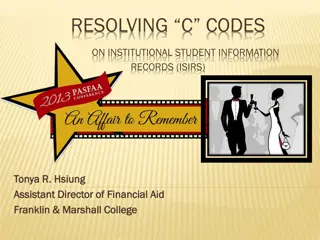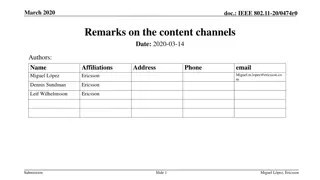
Guide to Codes of Ethics in Business
A code of ethics is a crucial guide outlining principles for conducting business with honesty and integrity. It sets ethical guidelines, best practices, and consequences for violations, encompassing areas like professional conduct, compliance, and values. Learn about the importance of codes of ethics, types found in businesses, and their impact on various industries.
Download Presentation

Please find below an Image/Link to download the presentation.
The content on the website is provided AS IS for your information and personal use only. It may not be sold, licensed, or shared on other websites without obtaining consent from the author. If you encounter any issues during the download, it is possible that the publisher has removed the file from their server.
You are allowed to download the files provided on this website for personal or commercial use, subject to the condition that they are used lawfully. All files are the property of their respective owners.
The content on the website is provided AS IS for your information and personal use only. It may not be sold, licensed, or shared on other websites without obtaining consent from the author.
E N D
Presentation Transcript
Code Of Ethics name : Abdulsalam Elfallah Stno:3138
Introduction A code of ethics is a guide of principles designed to help professionals conduct business honestly and with integrity. A code of ethics document may outline the mission and values of the business or organization, how professionals are supposed to approach problems, the ethical principles based on the organization's core values, and the standards to which the professional is held. A code of ethics, also referred to as an "ethical code," may encompass areas such as business ethics, a code of professional practice, and an employee code of conduct. 1
Key take ways In some industries, including banking and finance, specific laws govern business conduct. In others, a code of ethics may be voluntarily adopted. A code of ethics sets out an organization's ethical guidelines and best practices to follow for honesty, integrity, and professionalism. For members of an organization, violating the code of ethics can result in sanctions including termination. The main types of codes of ethics include a compliance- based code of ethics, a value- based code of ethics, and a code of ethics among professionals. A focus on climate change has become an integral part of companies' codes of ethics, detailing their commitment to sustainability. 3
Understanding Codes of Ethics Both businesses and trade organizations typically have some sort of code of ethics that their employees or members are supposed to follow. Breaking the code of ethics can result in termination or dismissal from the organization. A code of ethics is important because it clearly lays out the rules for behavior and provides the groundwork for a preemptive warning. Business ethics refers to how ethical principles guide a business's operations. Common issues that fall under the umbrella of business ethics include employer-employee relations, discrimination, environmental issues, bribery, insider trading, and social responsibility. While many laws exist to set basic ethical standards within the business community, it is largely dependent upon a business's leadership to develop a code of ethics. Given the importance of climate change and how human behavior has led to severely impacting the climate, many companies have taken to include climate factors in their code of ethics. These principles include manners in which the company is dedicated to operating sustainably or how they will shift to doing so. 4
Types of codes of ethics A code of ethics can take a variety of forms, but the general goal is to ensure that a business and its employees are following state and federal laws, conducting themselves with an ideal that can be exemplary, and ensuring that the business being conducted is beneficial for all stakeholders. The following are three types of codes of ethics found in business. Compliance-Based Code of Ethics Value-Based Code of Ethics Code of Ethics in Different Professions 5
Example of Code of Ethics Many firms and organizations have adopted a Code of Ethics. One good example comes from the CFA Institute (CFAI), the grantor of the Chartered Financial Analyst (CFA) designation and creator of the CFA exams. CFA Charterholders are among the most respected and globally recognized financial professionals. According to the CFAI's website, members of the CFA Institute, including CFA Charterholders, and candidates for the CFA designation must adhere to the following Code of Ethics: Act with integrity, competence, diligence, respect, and in an ethical manner with the public, clients, prospective clients, employers, employees, colleagues in the investment profession, and other participants in the global capital markets. 6
What Are the Five Codes of Ethics? All companies will have a different code of ethics with different areas of interest, based on the industry they are involved in, but the five areas that companies typically focus on include integrity, objectivity, professional competence, confidentiality, and professional behavior. 7
How to Create a Code of Ethics? Organizations create codes of ethics in order to eliminate unacceptable or immoral behavior from their members. These are typically structured around existing ethical issues within their industry. The first step is for the organization to identify its priorities, as well as any ethical issues that it wishes to avoid. For example, an organization may want to avoid having conflicts of interest, because of previous scandals in which employees acted against the interests of the company or clients. As a result, their code of ethics might prohibit certain inappropriate relationships, or prohibit employees from any appearance of a conflict of interests. 8
Conclusion Code of ethics is a basic need for any career. It shows that sustain the career is served services in the right way and without take any harm to the public or client direct or indirectly 9
Reflection In my opinion the code of ethics is important to keep the relation between you and the customer very good And not only in business, ethics make a good character from a person. 10
REFRENCES Driver, j (2014, September 22). The history of utilitarianism. Stanford encyclopedia of philosophy. Retrieved November 14, 2022 from https://plato.Stanford.edu/entries/utilitarianism-history/ 11
Conclusion Code of ethics is a basic need for any career. It shows that sustain the career is served services in the right way and without take any harm to the public or client direct or indirectly THANK YOU 15






















